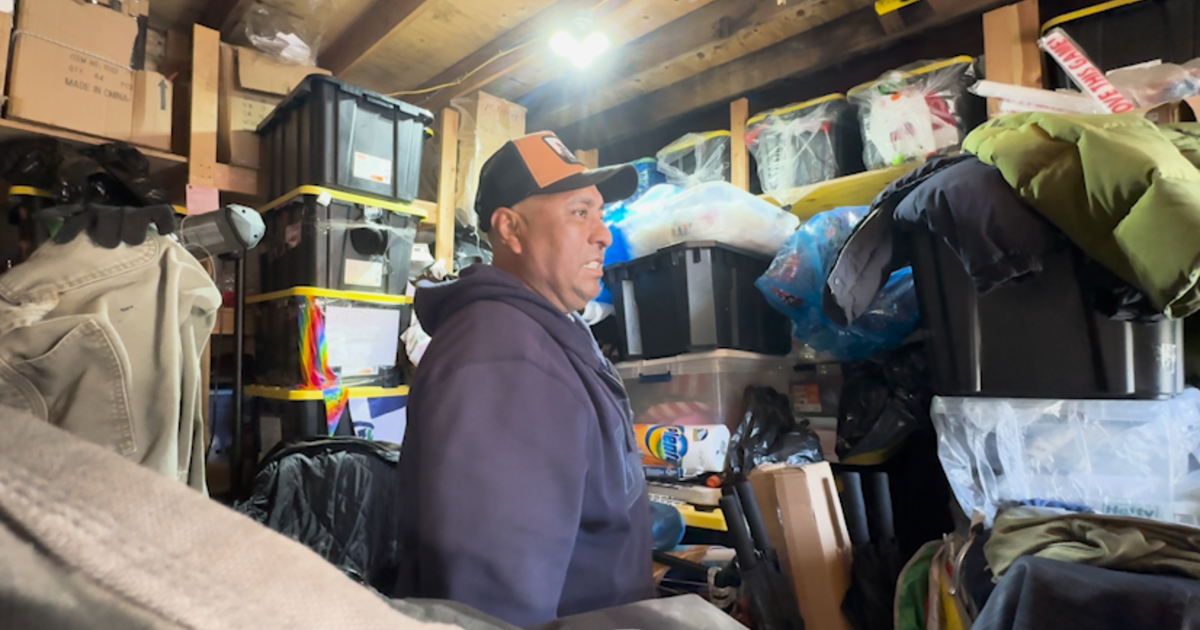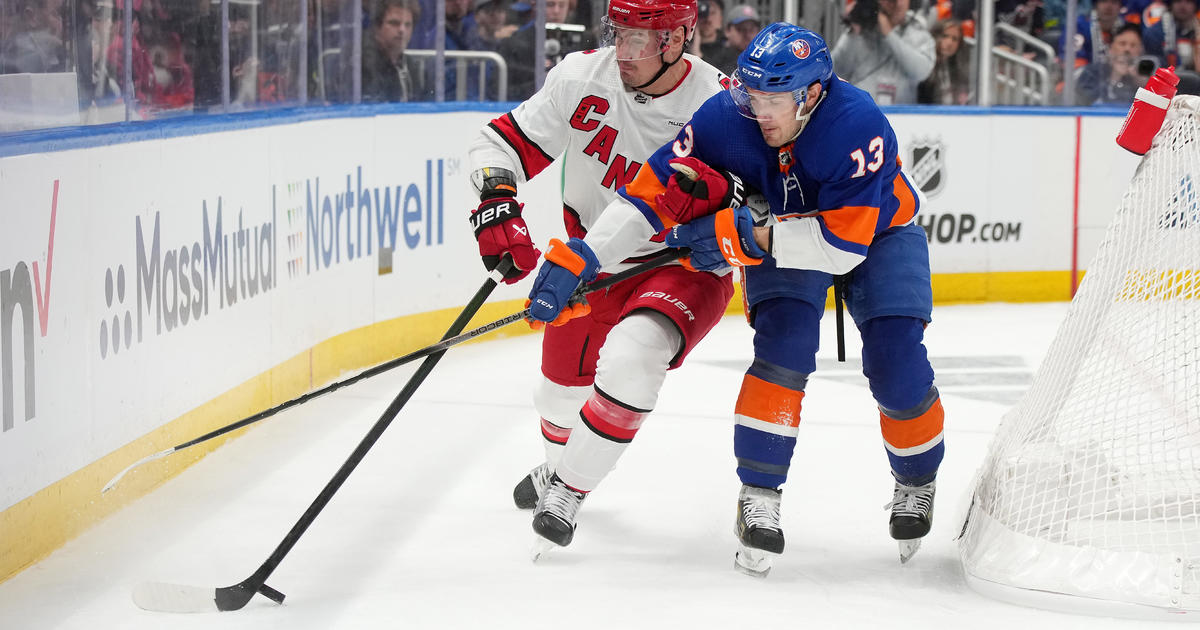NHL GM's To Discuss The Rise In Concussions
NEW YORK (AP) — Blind side hits to the head are down in the NHL, yet concussions are up. Now general managers have to decide if more rules are needed to make pro hockey safer.
The debate will rage on next week when the 30 GMs convene in Florida to discuss what's become a steadily growing problem, not just in hockey but throughout sports. NHL Commissioner Gary Bettman says Rule 48, which makes those blind side hits illegal, is working, but many are questioning whether it goes far enough.
If the league wasn't under enough pressure already with the absence of Sidney Crosby since January because of a concussion, two events last week turned up the heat further. First came the news that longtime enforcer Bob Probert suffered from brain damage at the time of his death, and then Montreal's Max Pacioretty was seriously injured on a hit — prompting both a criminal investigation and a threat from sponsor Air Canada to break ties with the league.
Some are calling for all head contact to be banned from the NHL as other hockey leagues have done. One of those is Florida forward David Booth, limited to 28 games last season because of a pair of concussions from hits that left him hospitalized.
"Guys need to respect players a little bit more," he said. "That's the biggest thing. When a guy is in a blind spot, instead of putting him through the boards or into the fifth row, just kind of play the body but take a little off.
"There is a time and place to make a big hit, along the boards when the guy can see you, but not in open ice going full speed."
Philadelphia Flyers captain Mike Richards' hit on Booth, along with a shot by Pittsburgh's Matt Cooke against Boston's Marc Savard, ignited the calls to outlaw head shots.
"I don't see why you need to have contact to the head," Booth said.
Others, such as Toronto Maple Leafs GM Brian Burke, are afraid that added rules will unnecessarily take away the physicality of hockey that fans love.
"I'd love to be a fly on the wall in those meetings, just to sort of hear the logic and the rationale at least where it's headed," Edmonton Oilers coach Tom Renney said. "Behind the bench, certainly we have an opinion that could be valuable, but at the same time there is a real emotional connection to the game from (the bench), too.
"So you don't know if you're accurate or not."
The NHL considers itself a pioneer among sports leagues in dealing with concussions. The league began studying it in 1997 and created baseline neurological testing methods so that concussed players could be prevented from returning to the ice before they resumed normal cognitive function.
This season is the first full one with the headshot ban.
"It's made a difference from the standpoint that players are receptive and aware and there is a consequence," said former All-Star Keith Primeau, whose career was ended by concussions. "At the same time, the rule doesn't address that guys are big, guys are strong, and guys are fast."
Without divulging any statistics, Bettman said research has shown that the majority of concussions result from accidental or incidental contact, and not from illegal hits.
"I love the contact part of hockey and football, and that introduces the risk of injury," said Dr. Michael Stuart, a father of two NHL players and the vice chair of orthopedic surgery and the co-director of sports medicine center departments at the Mayo Clinic. "I don't think I would enjoy watching flag football at the NFL level and I certainly would not enjoy no body checking at the NHL level.
"We just have to differentiate what is potentially dangerous and what is willful and what is accidental."
Crosby's injury brought more attention to the problem. He was first struck in a collision during the nationally televised New Year's Day Winter Classic and then hit again four days later. He hasn't played since.
Evidence is strong that a second hit after an initial concussion has been sustained causes more damage and increases recovery time.
"It hurts the league when Sidney Crosby is out," St. Louis Blues President John Davidson said. "It's part of the lure and the draw of NHL hockey. However, sometimes things happen. I know the concussion to Sidney is something we have to pay attention to.
"Should we have stricter rules regarding whether the player comes back to play right away if he has lost consciousness? There are some rules in there, but should they be re-looked at?"
Pacioretty was injured taking a big hit from Bruins defenseman Zdeno Chara, who drove the Canadiens forward into a stanchion and left him with a severe concussion and cracked vertebra. Chara was ejected but not suspended, with Bettman defending the decision as the appropriate response to a terrible but accidental injury.
However, Montreal police have started a criminal investigation into the hit at the request of Quebec's director of criminal and penal prosecutions, while Air Canada told the NHL it is considering withdrawing its sponsorship unless the league tightens rules to reduce potentially serious injuries.
"Air Canada is a great brand, as is the National Hockey League," Bettman said, "and if they decide they need to do other things with their sponsorship dollars that's their prerogative, just like it's the prerogative of our clubs that fly on Air Canada to make other arrangements if they don't think Air Canada is giving them the appropriate level of service."
Quebec Premier Jean Charest and major sponsor Via Rail, Canada's government-owned passenger railway, joined the chorus of criticism Friday, condemning the NHL for not suspending Chara and doing more to protect players.
Bettman announced during All-Star weekend in January that concussions are on the rise. The league's position is that though Crosby — the face of the sport — is one of the latest victims, the increase might not be as bad as it seems.
With greater knowledge of symptoms by players and health officials, diagnosis of concussions is becoming easier. The stigma of reporting by injured players is also lessening in the macho world of hockey.
"In sports at high risk for concussion, the majority of them go unrecognized," said Dr. Robert Cantu, a clinical professor of neurosurgery and co-founder of the Sports Legacy Institute. "As we get better at recognizing them, the incidents are going to rise even though the true incidents may actually be falling."
Research is being done by Boston University's Center for the Study of Traumatic Encephalopathy, a collaborative venture between the university's medical school and the Sports Legacy Institute.
That group discovered Probert's brain damage.
"It's very important to understand where concussions are coming from and how they're happening because lessons can be learned that will reduce the chance of concussions in the future," Cantu said.
Which brings us to Probert, who died last year at 45 of heart failure.
Tests of his donated tissue revealed that he also suffered from the brain degenerative disease chronic traumatic encephalopathy. Probert lived a hard life that included serious bouts with alcoholism, but the toll of his profession — he racked up 3,300 penalty minutes — was likely a key factor in his traumatic brain damage.
At this point, however, the abolishment of fighting doesn't appear to be on the radar of the league's decision-makers.
"If we took a part of the game — not the most important part, not the most significant part — but something that has been a part of the game and removed it from the game, would it impact ticket sales and viewership? I don't think anybody knows for sure," Bettman said. "I do know all the research we do is that most of our fans, and most by a large number, understand the role of fighting in the game and do not want to see it removed."
Jody Shelley of the Philadelphia Flyers has made a living mostly on the skill of his flying fists. He has absorbed untold punishment, even though he is considered one of — if not the best and most feared — brawler of his era.
The 35-year-old Shelley is the modern on-ice version of Probert, who protected teammates on the Detroit Red Wings and Chicago Blackhawks for 16 NHL seasons. Shelley has the most fighting majors since he joined the NHL during the 2000-01 season.
"It's a scary thing to hear when you have a guy like that that's suffered something presumably from playing," Shelley of Probert. "It's one of those things that with all the knowledge that we can have we're smarter here. I'm not saying smarter than him, I just think we're learning more.
"We're aware that if you're not smart about certain things, there might be long-term effects. You see it in every sport. Football is really bringing it to the forefront and it's good to see it in hockey."
Concussions are dominating the sports landscape. Star skier Lindsey Vonn is back from a concussion that forced her to skip the second half of last month's world championships. The NBA is working with an independent neurologist and might have a league-wide concussion policy in place by next season.
Primeau, who retired in 2006, is among those who has committed to donate his brain to research.
"Those that have had concussive issues, and certainly those who have had their careers sidetracked by concussions, have been very receptive as a group toward donating their brains when they are no longer with us," Cantu of the Sports Legacy Institute said. "The average individual playing hockey has not yet been touched by concussion. That's a little harder group to reach."
For now, Primeau is an outspoken advocate for brain research and the need to make hockey safer. He has been in contact with Crosby to answer the Penguins captain's questions and concerns.
"Absolutely, there has to be no head contact," the 6-foot-5 Primeau said. "I went into a game, I knew how I had to play. I couldn't change the way I played or else I couldn't or wouldn't be effective. I knew that — whether accidental or intentional — if I caught somebody from behind or accidentally swung my stick and caught them with a high-stick that there was a penalty.
"That's the same thing that would happen with no head contact. Players would adjust."
Football has been dealing with issues of brain injuries, as well, and the spotlight was again focused on the NFL when former player Dave Duerson recently committed suicide with a gunshot to the chest. Before taking his life, Duerson declared his wish to have his brain donated to research, and didn't damage his head during his suicide attempt.
"It breaks my heart," Primeau said. "I know where he is coming from. The emotional strain is a byproduct. For me it wasn't a direct symptom. The way you feel, the pain and the frustration, and the hurt, it's amazing how overwhelming it can be.
"You just don't know what people's breaking point is."



